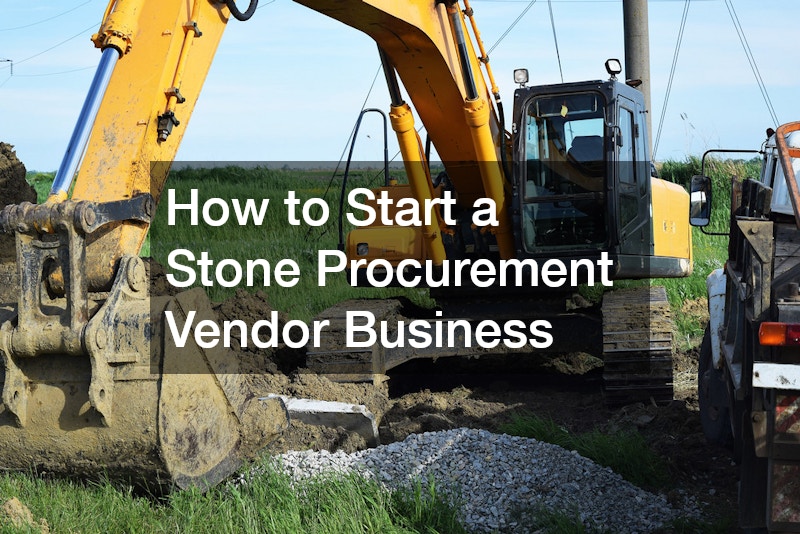Starting a business in the stone industry requires more than just an interest in construction materials—it demands strategy, foresight, and resilience. For entrepreneurs aiming to succeed as a procurement vendor, this means understanding industry dynamics, building lasting relationships with suppliers and clients, and navigating a competitive yet rewarding market. A well-structured foundation ensures that the business can withstand market shifts and establish a long-term presence. Success in this space is not only about selling a product but also about aligning operations with demand, managing resources effectively, and cultivating trust within the community.
At the heart of building such a company is the ability to position yourself as a reliable partner in the supply chain. This role goes beyond simply sourcing stone; it is about bridging the gap between supply and demand while maintaining efficiency, quality, and accountability. By creating a business that combines operational know-how with market insight, entrepreneurs can carve out a niche in this dynamic industry. Establishing credibility early on sets the tone for future growth and helps ensure that both clients and suppliers see the business as dependable and professional.
Breaking into this field also requires an entrepreneurial mindset that balances ambition with practicality. New business owners must be ready to invest time in learning industry standards, understanding customer expectations, and building processes that can scale over time. Unlike businesses that thrive solely on marketing or trend-based demand, success here depends on consistency, reliability, and long-term relationships. Entrepreneurs who approach the work with patience, adaptability, and a focus on delivering value will find greater opportunities for stability and growth.
Understanding the Stone Procurement Industry

The stone procurement industry is a multifaceted field that serves a wide range of sectors, including construction, landscaping, and memorial services. To thrive, new business owners must recognize how stone is sourced, graded, and distributed, as well as understand the diverse applications that create demand. The industry relies on a strong network of suppliers and distributors, which means staying informed about supply chains, regulations, and trends is critical. With global and regional markets often impacting pricing and availability, success hinges on knowing how to adapt and remain competitive.
For example, companies working with a headstone company may need to supply stone that meets specific quality and design standards, while other sectors may prioritize volume or durability. A procurement vendor must balance these differing needs by developing reliable sourcing channels and managing expectations on both sides. By learning the nuances of what drives customer requirements in each sector, entrepreneurs can successfully position themselves as specialists who deliver value, consistency, and reliability across multiple markets.
Identifying Your Target Market
Defining a target market is a vital step in launching any business, particularly in an industry as broad as stone procurement. Rather than trying to serve everyone, successful entrepreneurs narrow their focus to the customer segments that align with their capabilities and resources. For instance, some markets prioritize aesthetics, while others emphasize strength, durability, or cost-efficiency. Understanding these distinctions allows businesses to craft more tailored marketing, set realistic pricing strategies, and develop offerings that meet real demand. In short, knowing who you serve informs every other decision you make.
For those targeting memorial services, providing a flat headstone requires careful attention to material consistency, surface finish, and customization potential. In this case, a procurement vendor must assess which types of stone are most appropriate for lasting quality, as well as evaluate the logistics of transporting and finishing products to meet client expectations. By identifying such a specific niche and understanding its requirements, entrepreneurs can build a reputation for specialized expertise that separates them from broader competitors.
Developing a Strong Business Plan

A well-developed business plan is the foundation of any successful venture, particularly in industries that involve large investments and complex supply chains. By outlining goals, strategies, financial projections, and operational workflows, entrepreneurs gain a roadmap that helps guide both short-term decisions and long-term growth. A strong plan also demonstrates credibility to investors, lenders, and potential partners, making it easier to secure funding and build trust. More importantly, it forces business owners to anticipate risks, identify opportunities, and align their vision with market realities.
When creating a plan for a stone procurement business, it is important to consider not just the costs of sourcing and distribution, but also the equipment and services necessary for the trade. For example, a concrete cutter may play a role in preparing or finishing materials to meet client specifications. A procurement vendor should incorporate such operational details into their business model to ensure they are not only supplying raw materials but also anticipating the finishing or modification processes that add value. This level of detail strengthens the business plan by showing an awareness of customer needs beyond simple supply.
Registering and Licensing Your Business
Establishing a legal framework for your business is essential for operating with legitimacy and protecting yourself from liability. Registration, tax identification numbers, and proper licensing ensure compliance with local, state, and federal regulations. Depending on the region, certain types of stone distribution may also require specific permits, particularly if you are handling large shipments or materials sourced internationally. These requirements may seem like administrative hurdles, but they form the backbone of a professional operation. Without them, businesses risk fines, delays, or even closure.
In the stone industry, it is not uncommon for businesses to require specialized services to support daily operations, such as rock hauling services. By incorporating these logistics into the registration and licensing process, a vendor can ensure that their supply chain is not only legally compliant but also practical and reliable. This preparation allows for smoother operations when scaling the business, while also signaling to clients that the company operates with both professionalism and transparency.
Building Reliable Supplier Relationships

Strong supplier relationships are one of the most important assets in the stone procurement business. Suppliers are not only the source of your products but also the partners who influence your ability to meet deadlines, maintain quality, and manage costs. Building trust, maintaining consistent communication, and honoring agreements all contribute to long-lasting partnerships. In turn, reliable suppliers provide consistency, help manage inventory challenges, and may even offer favorable pricing or terms to businesses they value. Cultivating these relationships is therefore a long-term investment in stability and growth.
Consider the case of working alongside a paving contractor, where quality stone and timely delivery directly affect the outcome of projects. If a procurement vendor cannot provide a dependable supply, the contractor’s reputation and schedules may suffer. By developing close working relationships with trusted suppliers, entrepreneurs can ensure that partners like contractors receive the right materials when needed, strengthening professional bonds and generating repeat business. Ultimately, these strong relationships can be the key to a competitive advantage in a crowded marketplace.
Establishing a Competitive Pricing Strategy
Pricing is a critical factor that can make or break a business in the stone procurement industry. Setting prices too high can drive customers toward competitors, while setting them too low can eat away at profits and undervalue the business. A competitive pricing strategy balances cost coverage, market demand, and profit margins, ensuring sustainability while remaining attractive to clients. This requires market research, awareness of competitors’ rates, and a clear understanding of how much value your services add beyond just providing stone.
For instance, when dealing with construction material, customers may evaluate options not only based on cost but also on quality, delivery reliability, and consistency. A procurement vendor should factor these considerations into pricing decisions, highlighting the added value of dependable supply and customer support. By presenting pricing as a reflection of both quality and service, entrepreneurs can differentiate themselves in a market where the lowest cost is not always the most reliable choice.
Creating a Professional Brand Identity

A strong brand identity conveys trust, professionalism, and reliability in the eyes of clients and suppliers. Branding is more than just a logo or company name; it represents the values, tone, and reputation of the business. Developing consistent messaging, polished visuals, and a clear mission helps create a recognizable identity that customers remember. In a competitive industry, a professional brand identity sets businesses apart and fosters customer confidence.
For example, a business offering a landscape service may rely on the quality of its stone supply to meet client expectations. If the procurement vendor supplying the materials presents itself with professionalism and consistent branding, it strengthens the landscaper’s ability to deliver quality results. This creates a ripple effect where the vendor’s strong identity indirectly supports the branding of its clients, making reliability a shared value across the supply chain.
Marketing Your Services Effectively
No matter how strong the business model, effective marketing is necessary to generate awareness and attract customers. Marketing strategies should include both digital and traditional channels, ranging from online advertising and social media presence to networking events and industry partnerships. Clear messaging about what the company offers, paired with proof of reliability and success stories, can help build a strong reputation and draw in new clients.
Consider a paving company that depends on timely access to specific types of stone to complete projects efficiently. By marketing services in a way that emphasizes dependable supply and tailored solutions, a procurement vendor can position itself as the go-to partner for such businesses. Highlighting this reliability in promotional materials ensures potential customers understand that they are working with a supplier who recognizes their needs and delivers consistently.
Managing Operations and Logistics
Efficient operations and logistics are the backbone of a successful stone procurement business. From sourcing materials to coordinating transportation and storage, every step must be carefully managed to avoid costly delays or disruptions. Streamlining these processes not only reduces overhead but also ensures timely delivery, which directly impacts customer satisfaction and retention. A procurement vendor who invests in reliable systems and workflows is better positioned to meet the demands of a growing client base.
For instance, coordinating with commercial landscapers requires attention to scheduling, order accuracy, and delivery methods. These clients often work on tight timelines and rely on precise material specifications to complete projects. By implementing strong logistics and operational planning, a procurement vendor can build a reputation for reliability, ensuring that landscaping professionals receive the exact stone products they need without interruptions.
Ensuring Compliance and Sustainability
In today’s business landscape, compliance and sustainability are no longer optional—they are essential for maintaining credibility and long-term viability. Compliance with industry regulations, environmental standards, and safety requirements helps businesses avoid penalties and demonstrates accountability. Meanwhile, sustainable practices, such as responsible sourcing and minimizing waste, appeal to clients who value eco-conscious operations. Integrating both into daily processes reflects a forward-thinking approach that sets a company apart from competitors.
For example, a procurement vendor may work with a hydroseeding service that values environmentally responsible stone products for erosion control projects. By ensuring compliance with environmental standards and sourcing responsibly, the vendor demonstrates alignment with the sustainability goals of its partners. This not only builds trust but also opens opportunities with clients who prioritize ecological responsibility in their business decisions.
Building a Lasting Business Legacy
Launching a stone procurement business is both a challenge and an opportunity. Success requires a clear vision, strong planning, reliable supplier relationships, and the ability to adapt to market demands. By developing professional branding, effective marketing strategies, and efficient operations, entrepreneurs can establish themselves as trusted players in the industry. Compliance and sustainability further strengthen a company’s reputation, helping it stand out in a competitive field.
The role of a procurement vendor is about more than simply moving stone from one place to another—it is about creating value, reliability, and trust at every stage of the supply chain. By understanding the nuances of customer needs, balancing costs with quality, and building strong partnerships, entrepreneurs can carve out a lasting presence in the marketplace. With the right foundation, this business can not only thrive but also become a cornerstone of the industries it serves. Success in this industry ultimately depends on dedication, strategic planning, and a commitment to excellence. Businesses that focus on understanding client needs, maintaining strong relationships, and delivering consistent quality create a foundation for long-term growth.


